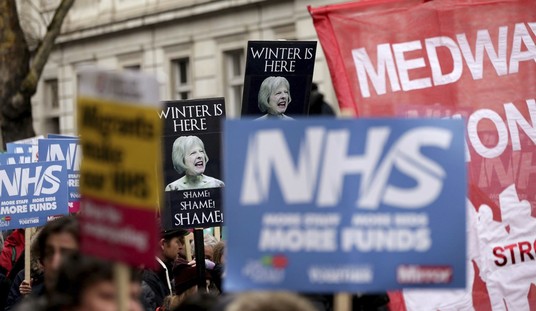With health care a perennial election issue, Americans need to decide whether to take a more free-market approach or move towards a government-run system. Perhaps a testimonial by F. Brinley Bruton might assist in that choice. Bruton has the unique perspective of having to use both American and British systems to treat the same serious illness — and the experiences couldn’t be more different, although Bruton’s choice may surprise some readers:
A few weeks ago I found myself curled up in a hospital here in London, my feverish body shaking violently back and forth. The pain in my side and back made it hard to straighten my torso, and I’d thrown up in a friend’s car on the way to the hospital.
The hospital couldn’t find an extra hospital bed, so I spent my first night hooked up to an IV on a gurney in the middle of a row of men and women, my sweaty skin sticking to the plastic. A shriveled woman in the bed to my right issued loud and largely unintelligible commands to nobody in particular. A steady flow of patients visited the bathroom right in front of my bed. A shouting match broke out between some of the nurses and nurses aides until a man at the other end of the room yelled, “Could you please take it outside? I’m trying to rest.”
Sometime in the midst of this I was diagnosed with pyelonephritis, a severe urinary tract infection that had spread to a kidney, and ended up in the hospital for three nights. I had already been on two courses of antibiotics, but that hadn’t cleared up the initial infection. Finding myself sick and alone thousands of miles away from my mom was bad enough, but scarier still was just how familiar the illness felt.
I’d been sick with the same thing almost 10 years ago when I was in my 20s and still living in the United States, where I’m from. In both cases, my side and back hurt and fever shot up. And each time, I recovered after serious doses of antibiotics and lots of bed rest. But apart from that, my experiences were a world apart.
This is a lengthy read, but worthwhile. It talks honestly about the benefits and drawbacks of both systems, and gives readers a choice of nightmares. Would you rather have the most attentive and consistent of care and get forced into bankruptcy, or would you rather have more efficiency, less cost — and get ignored or worse while fighting to get attention?
The choice isn’t as easy as it seems, in part because Bruton seems to miss the common thread of the probems in both systems. Both systems hide the true cost of the care from the consumer, only in Britain that’s done a little more transparently than in America. Bruton received top-flight care but ran afoul of her insurance, a situation which we’ve repeatedly experienced ourselves. In the end, she wound up paying thousands of dollars for care that should have been covered by insurance, mostly because she waited far too long to seek attention.
In Britain, the cost comes right off the top of her salary, but that’s only the basic cost. Bruton had to negotiate for attention every step of the way through her treatment, essentially competing for severely rationed treatment with other consumers. Bruton succeeded, and she feels relatively sanguine about the results, but the anecdotes should horrify the rest of us. Thanks to a lack of competition, Bruton also admits that she’s fortunate enough to have a competent provider in her neighborhood — which many of her co-consumers do not have.
In both situations, the common problem is a centralized payment system that disconnects consumers from the cost of medical care and eliminates competition. What’s truly needed is a shift away from comprehensive insurance care to a combination of catastrophic coverage partnered with tax-free HSAs that would allow people to choose from truly competing providers for what’s known as primary care. That would lower costs for most of the medical treatment Americans receive as clinics would have to compete for business — much the same as non-covered treatments such as breast augmentation and Lasik clinics do, for instance — while containing costs for the rarer hospitalizations and lengthier treatment regimens through group insurance plans.
We need more free market in this system, not less. If we want to make health care delivery more efficient and less costly, competition and exposing true costs are the most effective methods for any market to reach efficiency.








Join the conversation as a VIP Member